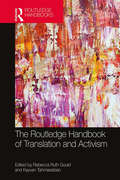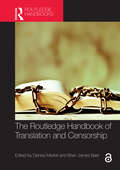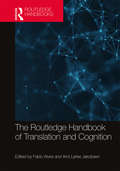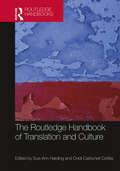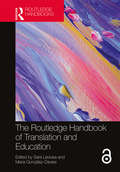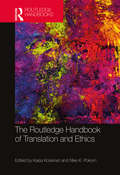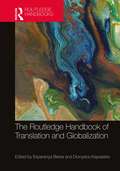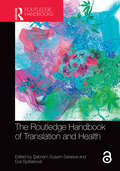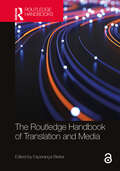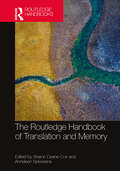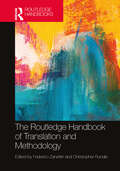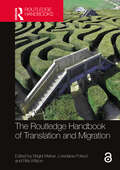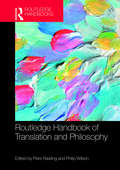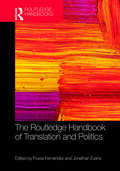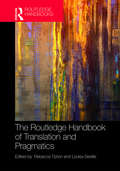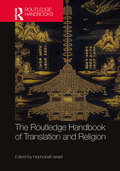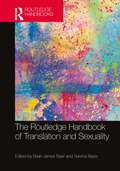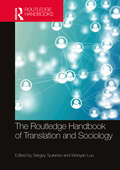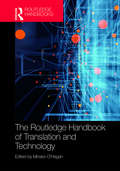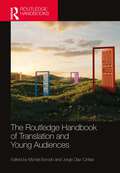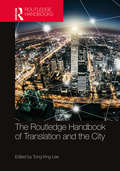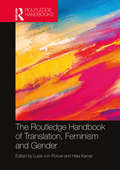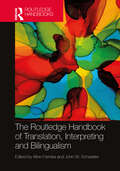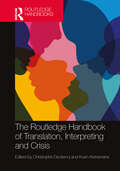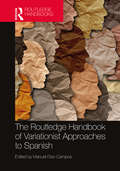- Table View
- List View
The Routledge Handbook of Translation and Activism (Routledge Handbooks in Translation and Interpreting Studies)
by Rebecca Ruth GouldThe Routledge Handbook of Translation and Activism provides an accessible, diverse and ground-breaking overview of literary, cultural, and political translation across a range of activist contexts. As the first extended collection to offer perspectives on translation and activism from a global perspective, this handbook includes case studies and histories of oppressed and marginalised people from over twenty different languages. The contributions will make visible the role of translation in promoting and enabling social change, in promoting equality, in fighting discrimination, in supporting human rights, and in challenging autocracy and injustice across the Middle East, Africa, Latin America, East Asia, the US and Europe. With a substantial introduction, thirty-one chapters, and an extensive bibliography, this Handbook is an indispensable resource for all activists, translators, students and researchers of translation and activism within translation and interpreting studies.
The Routledge Handbook of Translation and Censorship (Routledge Handbooks in Translation and Interpreting Studies)
by Brian James Baer Denise MerkleThe Routledge Handbook of Translation and Censorship is the first handbook to provide a comprehensive overview of the topic, offering broad geographic and historical coverage, and extending the political contexts to incorporate colonial and postcolonial viewpoints, as well as pluralistic societies. It examines key cultural texts of all kinds as well as audio-visual translation, comics, drama and videogames.With over 30 chapters, the Handbook highlights commonalities and differences across the various contexts, encouraging comparative approaches to the topic of translation and censorship. Edited and authored by leading figures in the field of Translation Studies, the chapters provide a critical mapping of the current research and suggest future directions.With an introductory chapter by the editors on theorizing censorship, the Handbook is an essential reference and resource for advanced students, scholars and researchers in translation studies, comparative literature and related fields.Chapter 30 of this book is freely available as a downloadable Open Access PDF at http://www.taylorfrancis.com under a Creative Commons Attribution-Non Commercial-No Derivatives (CC BY-NC-ND) 4.0 license.
The Routledge Handbook of Translation and Cognition (Routledge Handbooks in Translation and Interpreting Studies)
by Fabio AlvesThe Routledge Handbook of Translation and Cognition provides a comprehensive, state-of-the-art overview of how translation and cognition relate to each other, discussing the most important issues in the fledgling sub-discipline of Cognitive Translation Studies (CTS), from foundational to applied aspects. With a strong focus on interdisciplinarity, the handbook surveys concepts and methods in neighbouring disciplines that are concerned with cognition and how they relate to translational activity from a cognitive perspective. Looking at different types of cognitive processes, this volume also ventures into emergent areas such as neuroscience, artificial intelligence, cognitive ergonomics and human–computer interaction. With an editors’ introduction and 30 chapters authored by leading scholars in the field of Cognitive Translation Studies, this handbook is the essential reference and resource for students and researchers of translation and cognition and will also be of interest to those working in bilingualism, second-language acquisition and related areas.
The Routledge Handbook of Translation and Culture (Routledge Handbooks in Translation and Interpreting Studies)
by Sue-Ann Harding Ovidi Carbonell CortesThe Routledge Handbook of Translation and Culture collects into a single volume thirty-two state-of-the-art chapters written by international specialists, overviewing the ways in which translation studies has both informed, and been informed by, interdisciplinary approaches to culture. The book's five sections provide a wealth of resources, covering both core issues and topics in the first part. The second part considers the relationship between translation and cultural narratives, drawing on both historical and religious case studies. The third part covers translation and social contexts, including the issues of cultural resistance, indigenous cultures and cultural representation. The fourth part addresses translation and cultural creativity, citing both popular fiction and graphic novels as examples. The final part covers translation and culture in professional settings, including cultures of science, legal settings and intercultural businesses. This handbook offers a wealth of information for advanced undergraduates, postgraduates and researchers working in translation and interpreting studies.
The Routledge Handbook of Translation and Education (Routledge Handbooks in Translation and Interpreting Studies)
by Sara Laviosa Maria González-DaviesThe Routledge Handbook of Translation and Education will present the state of the art of the place and role of translation in educational contexts worldwide. It lays a sound foundation for the future interdisciplinary cooperation between Translation Studies and Educational Linguistics. By adopting a transdisciplinary perspective, the handbook will bring together the various fields of scholarly enquiry and practice that make a valuable contribution to enlarging the notion of translation and diversifying its uses in education. Each contribution provides an overview of the historical background to a given educational setting. Focusing on current research approaches and empirical findings, this volume outlines the development of pedagogical approaches, methods, assessment and curriculum design. The handbook also examines examples of pedagogies that integrate translation in the curriculum, the teaching method’s approach, design and procedure as well as assessment. Based on a multilingual and applied-oriented approach, the handbook is essential reading for postgraduate students, researchers and advanced undergraduate students of Translation Studies, and educationalists and educators in the 21st century post-global era.
The Routledge Handbook of Translation and Ethics (Routledge Handbooks in Translation and Interpreting Studies)
by Kaisa Koskinen; Nike K. PokornThe Routledge Handbook of Translation and Ethics offers a comprehensive overview of issues surrounding ethics in translating and interpreting. The chapters chart the philosophical and theoretical underpinnings of ethical thinking in Translation Studies and analyze the ethical dilemmas of various translatorial actors, including translation trainers and researchers. Authored by leading scholars and new voices in the field, the 31 chapters present a wide coverage of emerging issues such as increasing technologization of translation, posthumanism, volunteering and activism, accessibility and linguistic human rights. Many chapters provide the first extensive overview of the topic or present new takes on established areas. The book is divided into four parts, with the first covering the most influential ethical theories. Part II takes the perspective of agents in different contexts and the ethical dilemmas they face, while Part III takes a critical look at central institutions structuring and controlling ethical behaviour. Finally, Part IV focuses on special issues and new challenges, and signals new directions for further study. This handbook is an indispensable resource for all students and researchers of translation and ethics within translation and interpreting studies, multilingualism and comparative literature.
The Routledge Handbook of Translation and Globalization (Routledge Handbooks in Translation and Interpreting Studies)
by Esperança Bielsa Kapsaskis DionysiosThis is the first handbook to provide a comprehensive coverage of the main approaches that theorize translation and globalization, offering a wide-ranging selection of chapters dealing with substantive areas of research. The handbook investigates the many ways in which translation both enables globalization and is inevitably transformed by it. Taking a genuinely interdisciplinary approach, the authors are leading researchers drawn from the social sciences, as well as from translation studies. The chapters cover major areas of current interdisciplinary interest, including climate change, migration, borders, democracy and human rights, as well as key topics in the discipline of translation studies. This handbook also highlights the increasing significance of translation in the most pressing social, economic and political issues of our time, while accounting for the new technologies and practices that are currently deployed to cope with growing translation demands. With five sections covering key concepts, people, culture, economics and politics, and a substantial introduction and conclusion, this handbook is an indispensable resource for students and researchers of translation and globalization within translation and interpreting studies, comparative literature, sociology, global studies, cultural studies and related areas.
The Routledge Handbook of Translation and Health (Routledge Handbooks in Translation and Interpreting Studies)
by Şebnem Susam-SaraevaThe Routledge Handbook of Translation and Health provides a bridge between translation studies and the burgeoning field of health humanities, which seeks novel ways of understanding health and illness. As discourses around health and illness are dependent on languages for their transmission, impact, spread, acceptance and rejection in local settings, translation studies offers a wealth of data, theoretical approaches and methods for studying health and illness globally. Translation and health intersect in a multitude of settings, historical moments, genres, media and users. This volume brings together topics ranging from interpreting in healthcare settings to translation within medical sciences, from historical and contemporary travels of medicine through translation to areas such as global epidemics, disaster situations, interpreting for children, mental health, women’s health, disability, maternal health, queer feminisms and sexual health, and nutrition. Contributors come from a wide range of disciplines, not only from various branches of translation and interpreting studies, but also from disciplines such as psychotherapy, informatics, health communication, interdisciplinary health science and classical Islamic studies. Divided into four sections and each contribution written by leading international authorities, this timely Handbook is an indispensable resource for all students and researchers of translation and health within translation and interpreting studies, as well as medical and health humanities. Intorduction and Chapter 18 of this book are freely available as a downloadable Open Access PDF at http://www.taylorfrancis.com under a Creative Commons [Attribution-Non Commercial-No Derivatives (CC-BY-NC-ND)] 4.0 license.
The Routledge Handbook of Translation and Media (Routledge Handbooks in Translation and Interpreting Studies)
by Esperança BielsaThe Routledge Handbook of Translation and Media provides the first comprehensive account of the role of translation in the media, which has become a thriving area of research in recent decades. It offers theoretical and methodological perspectives on translation and media in the digital age, as well as analyses of a wide diversity of media contexts and translation forms. Divided into four parts with an editor introduction, the 33 chapters are written by leading international experts and provide a critical survey of each area with suggestions for further reading. The Handbook aims to showcase innovative approaches and developments, bridging the gap between currently separate disciplinary subfields and pointing to potential synergies and broad research topics and issues. With a broad-ranging, critical and interdisciplinary perspective, this Handbook is an indispensable resource for all students and researchers of translation studies, audiovisual translation, journalism studies, film studies and media studies.
The Routledge Handbook of Translation and Memory (Routledge Handbooks in Translation and Interpreting Studies)
by Sharon Deane-CoxThe Routledge Handbook of Translation and Memory serves as a timely and unique resource for the current boom in thinking around translation and memory. The Handbook offers a comprehensive overview of a contemporary, and as yet unconsolidated, research landscape with a four-section structure which encompasses both current debate and future trajectories. Twenty-four chapters written by leading and emerging international scholars provide a cross-sectional snapshot of the diverse angles of approach and case studies that have thus far driven research into translation and memory. A valuable, far-reaching range of theoretical, empirical, reflective, comparative, and archival approaches are brought to bear on translational sites of memory and mnemonic sites of translation through the examination of topics such as traumatic, postcolonial, cultural, literary, and translator memory. This Handbook is key reading for advanced undergraduates, postgraduates and researchers in translation studies, memory studies, and related areas.
The Routledge Handbook of Translation and Methodology (Routledge Handbooks in Translation and Interpreting Studies)
by Federico ZanettinThe Routledge Handbook of Translation and Methodology provides a comprehensive overview of methodologies in translation studies, including both well-established and more recent approaches. The Handbook is organised into three sections, the first of which covers methodological issues in the two main paradigms to have emerged from within translation studies, namely skopos theory and descriptive translation studies. The second section covers multidisciplinary perspectives in research methodology and considers their application in translation research. The third section deals with practical and pragmatic methodological issues. Each chapter provides a summary of relevant research, a literature overview, critical issues and topics, recommendations for best practice, and some suggestions for further reading. Bringing together over 30 eminent international scholars from a wide range of disciplinary and geographical backgrounds, this Handbook is essential reading for all students and scholars involved in translation methodology and research.
The Routledge Handbook of Translation and Migration (Routledge Handbooks in Translation and Interpreting Studies)
by Rita Wilson Brigid Maher Loredana PolezziThe Routledge Handbook of Translation and Migration explores the practices and attitudes surrounding migration and translation, aiming to redefine these two terms in light of their intersections and connections. The volume adopts an interdisciplinary and transnational perspective, highlighting the broad scope of migration and translation as not only linguistic and geographical phenomena, but also cultural, social, artistic, and psychological processes.The nexus between migration and translation, the central concern of this Handbook, challenges limited conceptualisations of identity and belonging, thereby also exposing the limitations of monolingual, monocultural models of nationhood. Through a diverse range of approaches and methodologies, individual chapters investigate specific historical circumstances and illustrate the need for an intersectional approach to questions of language access and language mediation.With its range of approaches and case studies, the volume highlights the inherently political nature of translation and its potential to shape social and cultural inclusion, emphasising the crucial role of language and translation in informing professional practices, institutional policies, educational approaches and community attitudes towards migration. By bringing together perspectives from both researchers and creative practitioners, this book makes an innovative contribution to ongoing global discussions on linguistic hospitality and diversity, ideal for those pursing postgraduate and doctoral studies in translation studies, linguistics, international studies and cultural studies.
The Routledge Handbook of Translation and Philosophy (Routledge Handbooks in Translation and Interpreting Studies)
by Philip Wilson J Piers RawlingThe Routledge Handbook of Translation and Philosophy presents the first comprehensive, state of the art overview of the complex relationship between the field of translation studies and the study of philosophy. The book is divided into four sections covering discussions of canonical philosophers, central themes in translation studies from a philosophical perspective, case studies of how philosophy has been translated and illustrations of new developments. With twenty-nine chapters written by international specialists in translation studies and philosophy, it represents a major survey of two fields that have only recently begun to enter into dialogue. The Routledge Handbook of Translation and Philosophy is a pioneering resource for students and scholars in translation studies and philosophy alike.
The Routledge Handbook of Translation and Politics (Routledge Handbooks in Translation and Interpreting Studies)
by Jonathan Evans Fruela FernandezThe Routledge Handbook of Translation and Politics presents the first comprehensive, state of the art overview of the multiple ways in which ‘politics’ and ‘translation’ interact. Divided into four sections with thirty-three chapters written by a roster of international scholars, this handbook covers the translation of political ideas, the effects of political structures on translation and interpreting, the politics of translation and an array of case studies that range from the Classical Mediterranean to contemporary China. Considering established topics such as censorship, gender, translation under fascism, translators and interpreters at war, as well as emerging topics such as translation and development, the politics of localization, translation and interpreting in democratic movements, and the politics of translating popular music, the handbook offers a global and interdisciplinary introduction to the intersections between translation and interpreting studies and politics. With a substantial introduction and extensive bibliographies, this handbook is an indispensable resource for students and researchers of translation theory, politics and related areas.
The Routledge Handbook of Translation and Pragmatics (Routledge Handbooks in Translation and Interpreting Studies)
by Rebecca Tipton Louisa DesillaThe Routledge Handbook of Translation and Pragmatics provides an overview of key concepts and theory in pragmatics, charts developments in the disciplinary relationship between translation studies and pragmatics, and showcases applications of pragmatics-inspired research in a wide range of translation, spoken and signed language interpreting activities. Bringing together 22 authoritative chapters by leading scholars, this reference work is divided into three sections: Influences and Intersections, Methodological Issues, and Applications. Contributions focus on features of linguistic pragmatics and their analysis in authentic and experimental data relating to a wide range of translation and interpreting activities, including: news, scientific, literary and audiovisual translation, translation in online social media, healthcare interpreting and audio description for the theatre. It also encompasses contributions on issues beyond the level of the text that include the study of interpersonal relationships in practitioner networks and the development of pragmatic competence in interpreter training. Each chapter includes many practical illustrative examples and a list of recommended reading. Fundamental reading for students and academics in translation and interpreting studies, this is also an essential resource for those working in the related fields of linguistics, communication and intercultural studies.
The Routledge Handbook of Translation and Religion (Routledge Handbooks in Translation and Interpreting Studies)
by Hephzibah IsraelThe Routledge Handbook of Translation and Religion is the first to bring together an extensive interdisciplinary engagement with the multiple ways in which the concepts and practices of translation and religion intersect. The book engages a number of scholarly disciplines in conversation with each other, including the study of translation and interpreting, religion, philosophy, anthropology, history, art history, and area studies. A range of leading international specialists critically engage with changing understandings of the key categories ‘translation’ and ‘religion’ as discursive constructs, thus contributing to the development of a new field of academic study, translation and religion. The twenty-eight contributions, divided into six parts, analyze how translation constructs ideas, texts or objects as 'sacred' or for ‘religious purposes’, often in competition with what is categorized as ‘non-religious.’ The part played by faith communities is treated as integral to analyses of the role of translation in religion. It investigates how or why translation functions in re-constructing and transforming religion(s) and for whom and examines a range of ‘sacred texts’ in translation—from the written to the spoken, manuscript to print, paper to digital, architectural form to objects of sacred art, intersemiotic scriptural texts, and where commentary, exegesis and translation interweave. This Handbook is an indispensable scholarly resource for researchers in translation studies and the study of religions.
The Routledge Handbook of Translation and Sexuality (Routledge Handbooks in Translation and Interpreting Studies)
by Brian James Baer Serena BassiThe Routledge Handbook of Translation and Sexuality questions what it would mean to think of sexualities transnationally and explores the way cultural ideas about sex and sexuality are translated across languages. It considers how scholars chart the multilingual rise of the modern sexual sciences in the nineteenth and twentieth centuries, how translators, writers, and readers respond to sexual modernities and to what extent the keywords of queer social movements travel across borders.The handbook draws from fields as diverse as translation studies, critical multilingualism studies, comparative literature, European studies, Slavic studies, Middle Eastern studies, Latin American studies, and East Asian studies. This pioneering handbook maps out an emerging brand of women’s, gender, and sexuality studies that approaches sexualities as translational formations.Divided into two parts, the handbook covers:- Theoretical chapters on the interdisciplinary dialogue between translation studies and queer studies- Empirical studies of both canonic and minor scientific, religious, literary, philosophical, and political texts about sex and sexuality in translation across a variety of world languages.With 20 chapters written by leading academics from around the world, The Routledge Handbook of Translation and Sexuality will serve as an important reference for students and scholars in the fields of translation studies, applied linguistics, modern languages, and women’s, gender, and sexuality studies.
The Routledge Handbook of Translation and Sociology (Routledge Handbooks in Translation and Interpreting Studies)
by Sergey Tyulenev Wenyan LuoThe Routledge Handbook of Translation and Sociology is the first encyclopedic presentation of research into the social aspects of translation and interpreting. It consists of 35 chapters contributed by 40 experts in their respective fields of the sociology of translation. The Handbook traces the evolution of research into social aspects of translation and interpreting, explains the basics of the sociology of translation, offers an insight into studies of translation within sociology, and shows the place translation and interpreting occupies among social functional systems and its interactions with social forces and practices.With global coverage spanning all inhabited continents, the Handbook examines translational practices across diverse cultures and historical periods, from ancient origins to modern professional practices. Suitable for both undergraduate and postgraduate students of translation and interpreting, as well as researchers in the sociology of translation, the Handbook furnishes readers with a comprehensive understanding of the field. It offers a thorough exploration of the current state of the sociology of translation and suggests avenues for further research.
The Routledge Handbook of Translation and Technology (Routledge Handbooks in Translation and Interpreting Studies)
by Minako O'HaganThe Routledge Handbook of Translation and Technology provides a comprehensive and accessible overview of the dynamically evolving relationship between translation and technology. Divided into five parts, with an editor's introduction, this volume presents the perspectives of users of translation technologies, and of researchers concerned with issues arising from the increasing interdependency between translation and technology. The chapters in this Handbook tackle the advent of technologization at both a technical and a philosophical level, based on industry practice and academic research. Containing over 30 authoritative, cutting-edge chapters, this is an essential reference and resource for those studying and researching translation and technology. The volume will also be valuable for translators, computational linguists and developers of translation tools.
The Routledge Handbook of Translation and Young Audiences (Routledge Handbooks in Translation and Interpreting Studies)
by Michał Borodo Jorge Díaz-CintasThe Routledge Handbook of Translation and Young Audiences offers a comprehensive overview of translation in the context of young audiences.The handbook synthesises research on translation of children’s and young adult literature, audiovisual translation, the translation of comics and picture books, empirical research methods, and translation performed by fan communities in the digital world. Adopting a forward-looking approach, it is organised around these five key themes which, taken together, propose a new way of looking at interrelated phenomena which have never been brought together before to map this emerging area of study. Featuring 35 contributions from leading and emerging scholars, the volume showcases a range of perspectives which focus on translation and cultural practices around children and young adults not only as readers, viewers, and consumers but also as prosumers and collaborative creators of content.Providing a multi-layered perspective on the study of translation and young audiences, this handbook will be a valuable resource for students and scholars in translation studies, particularly those interested in audiovisual translation, media translation, multimodal texts, and children’s literature.
The Routledge Handbook of Translation and the City (Routledge Handbooks in Translation and Interpreting Studies)
by Tong King LeeThe Routledge Handbook of Translation and the City is the first multifaceted and cross-disciplinary overview of how cities can be read through the lens of translation and how translation studies can be enriched by an understanding of the complex dynamics of the city. Divided into four sections, the chapters are authored by leading scholars in translation studies, sociolinguistics, and literary and cultural criticism. They cover contexts from Brussels to Singapore and Melbourne to Cairo and topics from translation as resistance to translanguaging and urban design. This volume explores the role of translation at critical junctures of a city’s historical transformation as well as in the mundane intercultural moments of urban life, and uncovers the trope of the translational city in writing. This Handbook is critical reading for researchers, scholars and advanced students in translation studies, linguistics and urban studies.
The Routledge Handbook of Translation, Feminism and Gender (Routledge Handbooks in Translation and Interpreting Studies)
by Luise Von Flotow Hala KamalThe Routledge Handbook of Translation, Feminism and Gender provides a comprehensive, state-of-the-art overview of feminism and gender awareness in translation and translation studies today. Bringing together work from more than 20 different countries – from Russia to Chile, Yemen, Turkey, China, India, Egypt and the Maghreb as well as the UK, Canada, the USA and Europe – this Handbook represents a transnational approach to this topic, which is in development in many parts of the world. With 41 chapters, this book presents, discusses, and critically examines many different aspects of gender in translation and its effects, both local and transnational. Providing overviews of key questions and case studies of work currently in progress, this Handbook is the essential reference and resource for students and researchers of translation, feminism, and gender.
The Routledge Handbook of Translation, Interpreting and Bilingualism (Routledge Handbooks in Translation and Interpreting Studies)
by John W. Schwieter Aline FerreiraTranslation and interpreting can be seen as two special sub-types of bilingual communication. The field of bilingualism—from developmental, cognitive, and neuroscientific perspectives—is highly relevant to Translation and Interpreting Studies. The Routledge Handbook of Translation, Interpreting and Bilingualism is the first handbook to bring together the related, yet disconnected, fields of bilingualism and translation and interpreting studies. Edited by leading scholars and authored by a wide range of established authorities from around the world, the Handbook is divided into six parts and encompasses theories and method, the development of translator and interpreter competence and cognitive, neuroscientific and social aspects. This is the essential guide to bilingualism for advanced students and researchers of Translation and Interpreting studies and key reading on translation and interpreting for those studying and researching bilingualism.
The Routledge Handbook of Translation, Interpreting and Crisis (Routledge Handbooks in Translation and Interpreting Studies)
by Christophe Declercq Koen KerremansThis handbook offers a broad-ranging overview of the study of translating and interpreting in conflict and crisis settings and takes the field in new directions. Covering a wide selection of multimodal contexts that build on the fundamentals of translation, interpreting, and their in-between hybrid forms of mediation, the handbook is divided into four parts. The opening part covers perspectives on policy and practices, whether contemporary or historical, and cases truly span the globe, from Peru and Brazil, over Belgium and Sierra Leone, to Australia, Japan, and Hong Kong. International developments require profound considerations about the professionalisation of access to language in times of crises, not least in contexts of humanitarian negotiation or conflict zone interpreting–these form the second part. The subsequent part deals with spheres of community in which language needs are positioned within frames of agency, positionality, and trust, and the challenges that these face. The contributions build on cases where interpreters act as catalysts for translation needs in settings of humanitarian aid and beyond. The final part considers language strategies and solutions in crises. This handbook is the essential guide to translation and interpreting in conflict and crisis settings for advanced students and researchers of translation and interpreting studies and will be of wide interest in peace studies, political science, and beyond.
The Routledge Handbook of Variationist Approaches to Spanish (Routledge Spanish Language Handbooks)
by Manuel Díaz-CamposThe Routledge Handbook of Variationist Approaches to Spanish provides an up-to-date overview of the latest research examining sociolinguistic approaches to analyzing variation in Spanish. Divided into three sections, the book includes the most current research conducted in Spanish variationist sociolinguistics. This comprehensive volume covers phonological, morphosyntactic, social, and lexical variation in Spanish. Each section is further divided into subsections focusing on specific areas of language variation, highlighting the most salient and current developments in each subfield of Hispanic sociolinguistics. As such, this Handbook delves further into the details of topics relating to variation and change in Spanish than previous publications, with a focus on the symbolic sociolinguistic value of specific phenomena in the field. Encouraging readers to think critically about language variation, this book will be of interest to advanced undergraduate and graduate students, as well as researchers seeking to explore lesser-known areas of Hispanic sociolinguistics. The Routledge Handbook of Variationist Approaches to Spanish will be a welcome addition to specialists and students in the fields of linguistics, Hispanic linguistics, sociolinguistics, and linguistic anthropology.
